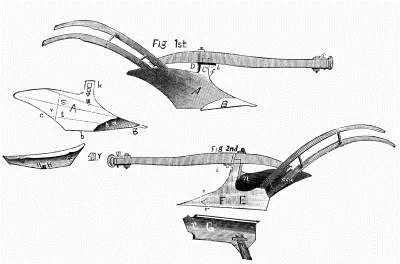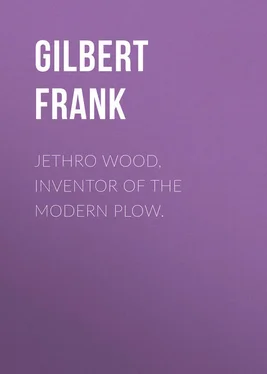Frank Gilbert - Jethro Wood, Inventor of the Modern Plow.
Здесь есть возможность читать онлайн «Frank Gilbert - Jethro Wood, Inventor of the Modern Plow.» — ознакомительный отрывок электронной книги совершенно бесплатно, а после прочтения отрывка купить полную версию. В некоторых случаях можно слушать аудио, скачать через торрент в формате fb2 и присутствует краткое содержание. Жанр: foreign_antique, foreign_prose, на английском языке. Описание произведения, (предисловие) а так же отзывы посетителей доступны на портале библиотеки ЛибКат.
- Название:Jethro Wood, Inventor of the Modern Plow.
- Автор:
- Жанр:
- Год:неизвестен
- ISBN:нет данных
- Рейтинг книги:3 / 5. Голосов: 1
-
Избранное:Добавить в избранное
- Отзывы:
-
Ваша оценка:
- 60
- 1
- 2
- 3
- 4
- 5
Jethro Wood, Inventor of the Modern Plow.: краткое содержание, описание и аннотация
Предлагаем к чтению аннотацию, описание, краткое содержание или предисловие (зависит от того, что написал сам автор книги «Jethro Wood, Inventor of the Modern Plow.»). Если вы не нашли необходимую информацию о книге — напишите в комментариях, мы постараемся отыскать её.
Jethro Wood, Inventor of the Modern Plow. — читать онлайн ознакомительный отрывок
Ниже представлен текст книги, разбитый по страницам. Система сохранения места последней прочитанной страницы, позволяет с удобством читать онлайн бесплатно книгу «Jethro Wood, Inventor of the Modern Plow.», без необходимости каждый раз заново искать на чём Вы остановились. Поставьте закладку, и сможете в любой момент перейти на страницу, на которой закончили чтение.
Интервал:
Закладка:
Frank Gilbert
Jethro Wood, Inventor of the Modern Plow. / A Brief Account of His Life, Services, and Trials; Together with Facts Subsequent to his Death, and Incident to His Great Invention

FAC-SIMILE OF THE ORIGINAL WOOD PLOW.
Side view of Plough. A Mould-board, the form of which is claimed as new. B Share claimed. C Standard claimed. DD Screw-bolt, and not confining the beam to the Standard. a , b , c , d , e , the 1st, 2d, 3d, 4th and 5th sides mentioned in the specification. g , g . Excavation at the fore part of the mould-board to receive the share which fills it up and forms an even surface. h Hole to receive the knob or head cast on the under side of the share, which, on being shoved up to its place, nooks under the mould-board at the upper side of the hole, and is held in its place by a wooden wedge driven between the knob and the lower side of the hole. f Notches in the Standard to receive the latch i in elevating or depressing the beam. s , t , v . Straight diagonal lines touching the mould-board the whole distance. u Vertical or plumb line touching the mould-board from top to bottom. H Reverse side of the share. x Knob to hold it fast to the mould-board. y Side view of knob. zz Shiplaps fitting under the point and edge of the mould-board. k Another form of standard keyed on top of beam. Fig. 2d, landside view: E The “landside”. F part of landside cast with mould-board. mm Cast loops to hold the handles claimed. n Head of screw-bolt held by a shoulder made by a projection from the mould-board and standard, through which the bolt passes up to the beam. o Share claimed. p Shiplap claimed. G Inside view of landside. r Tennon at forward end to fit into a dovetailed mortice on the inside of that part which is cast with the mould-board.
PREFACE
The immediate occasion of this little volume was a malignant misrepresentation from the pen of Ben: Perley Poore. With slight variation from the original text, the words of Thomas Jefferson about Benjamin Franklin and his maligners, quoted in the body of this monograph, apply to this case: I have seen with extreme indignation the blasphemies lately vended against the memory of the father of the American plow. But his memory will be venerated as long as furrows are turned and soil tilled. The present object, however, is not so much to refute falsehood as to establish the truth, and make it a part of the permanent knowledge of the public. To the extent that this object shall be attained, will these labors be rewarded.
It is not the design of this publication to disparage any one; on the contrary, it is desired to give ample credit to all who contributed to the solution of the plow problem. If only brief mention is made of others, it is because they really deserved but little credit, or their merits are forever buried in obscurity. It is proposed to set forth without exaggeration, the claims of the supreme inventor in this line to the grateful remembrance of the public. And by the public is meant not only the American people, but all who are fed from the ample granaries of this country, or share the benefits of the improved tillage, whether on this continent or in Europe, made possible and actual by the inventive genius of Jethro Wood.
JETHRO WOOD; INVENTOR OF THE MODERN PLOW
The last words ever penned by John Quincy Adams were these, written in the peculiarly tremulous hand of “the Old Man Eloquent:” “Mr. J. Q. Adams presents his compliments to the Misses Wood, and will be happy to see them at his house, at their convenience, any morning between 10 and 11 o’clock.” This note was found upon his desk when he was stricken down with paralysis, February 21, 1848, in his seat in the House of Representatives. The Misses Wood here referred to were the daughters of Jethro Wood, then deceased. They were at that time engaged in a labor of love, and the venerable Ex-President was their friend therein. Prompted more by filial affection than by hope of gain, they were making a final effort to secure from Congress a proper recognition of their father’s claim as an inventor. It is entirely safe to say that if Mr. Adams had been spared to the end of the Congress then in session, that claim would have been then duly recognized, and the name, services and genius of Jethro Wood become familiar to the American public.
Jethro Wood was born at Dartmouth, Massachusetts, on the sixteenth day of the third month of 1774. His parents were members of the Society of Friends. His mother, Dinah Hussey Wood, was a niece of Ann Starbuck, a woman of remarkable ability and high standing in colonial annals. Ann Starbuck was virtually governor of Nantucket. The niece was a woman of excellent intellect, and most winsome character. Her conversation sparkled with genial wit and good cheer. Her husband, John Wood, was a man of sterling worth, calm, self-poised, strong willed, and eminently influential. Jethro was their only son. On New Years Day, 1793, he was married to Sylvia Howland, at White Creek, Washington County, New York. The fruit of this marriage, every way a happy one, was a family of six children, namely: Benjamin; John; Maria, wife of Jeremiah Foote; Phœbe; Sarah, wife of Robert R. Underhill; Sylvia Ann, wife of Benjamin Gould. Of these children the only survivor is Mrs. Gould, who with her sister, Phœbe, were the Misses Wood of the Adams note. So much for the domestic setting of this diamond of inventive genius.
Even as a boy, Jethro Wood showed plainly the drift and trend of his mind. The child was indeed “father of the man,” and almost from the cradle to the grave, he was an inventor. In his childish plays he seemed busied with the idea which he ultimately perfected. Many curious incidents and memories are treasured among the traditions of his neighbors and friends. “When only a few years old,” writes a venerable man whose recollection spans two generations, “he moulded a little plow from metal, which he obtained by melting a pewter cup. Then, cutting the buckles from a set of braces, he made a miniature harness with which he fastened the family cat to his tiny plow, and endeavored to drive her about the flower-garden. The good old-fashioned whipping he received for this ‘mischief,’ was such as to drive all desire for repeating the experiment out of his juvenile head.”
Such innate and ruling passion might be suppressed, but could not be subdued. As his mind matured, his thoughts took definite shape. His home was always upon a farm, but he was never a farmer, in the sense of Poor Richard’s homely couplet:
“He who by the plow would thrive,
Himself must either hold or drive.”
Born in comparative affluence, blessed with a good education, an ample library and a well equipped workshop, enjoying the correspondence of such men as Thomas Jefferson and David Thomas, he was unremitting in his endeavor to realize his ideal. “His chief desire,” to quote further from our venerable correspondent, “was to invent a new mold-board, which, from its form, should meet the least resistance from the soil, and which could be made with share and standard, entirely of cast iron.” To hit upon the exact shape for the mold-board he whittled away, day after day, until his neighbors, who thought him mad on the subject, gave him the soubriquet of the “whittling Yankee.” His custom was to take a large oblong potato which was easy for the knife, and cut it till he obtained what he fancied was the exact curve.
Читать дальшеИнтервал:
Закладка:
Похожие книги на «Jethro Wood, Inventor of the Modern Plow.»
Представляем Вашему вниманию похожие книги на «Jethro Wood, Inventor of the Modern Plow.» списком для выбора. Мы отобрали схожую по названию и смыслу литературу в надежде предоставить читателям больше вариантов отыскать новые, интересные, ещё непрочитанные произведения.
Обсуждение, отзывы о книге «Jethro Wood, Inventor of the Modern Plow.» и просто собственные мнения читателей. Оставьте ваши комментарии, напишите, что Вы думаете о произведении, его смысле или главных героях. Укажите что конкретно понравилось, а что нет, и почему Вы так считаете.












